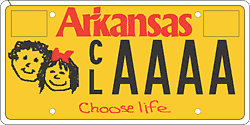The Arkansas state legislature finalized two bills today that would ban abortions and sent both to the desk of Governor Mike Beebe, who has yet to indicate he if will sign them into law.
The Arkansas Senate voted today for a bill that would ban virtually all abortions in the state. The measure would ban abortions at the point when a unborn child’s heart starts to beat.
 At 22 days into pregnancy, before most women know they are pregnant, unborn children complete the development of their heart to the point that a heartbeat begins and the bill would stop abortions at that point.
At 22 days into pregnancy, before most women know they are pregnant, unborn children complete the development of their heart to the point that a heartbeat begins and the bill would stop abortions at that point.
Some pro-life groups are not on board with the legislation, not because they oppose banning abortions but out of a concern that it will be struck down in court if passed, since the Supreme Court is currently dominated by at least a 5-4 pro-abortion majority. As a result, the legislation would be struck down in court and the ruling would add to the case law that supports Roe vs. Wade. Such groups are working to change the courts so Roe can be overturned and legislation like the Heartbeat bill or others could be approved to provide legal protection for unborn children.
Meanwhile, the House passed a bill Thursday that would ban most abortions in the state at 20 weeks into a pregnancy on an 80-10 vote.
The measure would make the Natural State the eighth state to enact such a 20-week abortion ban on the basis of substantial medical evidence that demonstrates that unborn children are capable of feeling pain at least from 20 weeks from fertilization.
Mary Spaulding Balch, J.D., director of state legislation for the National Right to Life Committee, has talked about such bills in other states.
“Medical science has changed over the last forty years,” she said. “Accordingly, elected officials across the country are looking at new medical advances and recognizing that our laws need to step into the future as we continue to learn more about the development of the unborn child.”
The most recent survey estimated that 1.5% of the 1.2 million annual abortions in the United States are performed on children at 19 weeks after fertilization, or older. That amounts to more than 18,000 abortions annually.
Alabama, Georgia, Idaho, Indiana, Kansas, Louisiana, Nebraska and Oklahoma have passed such legislation.
The science behind the concept of fetal pain is fully established and Dr. Steven Zielinski, an internal medicine physician from Oregon, is one of the leading researchers into it. He first published reports in the 1980s to validate research showing evidence for it.
He has testified before Congress that an unborn child could feel pain at “eight-and-a-half weeks and possibly earlier” and that a baby before birth “under the right circumstances, is capable of crying.”
He and his colleagues Dr. Vincent J. Collins and Thomas J. Marzen were the top researchers to point to fetal pain decades ago. Collins, before his death, was Professor of Anesthesiology at Northwestern University and the University of Illinois and author of Principles of Anesthesiology, one of the leading medical texts on the control of pain.
CLICK LIKE IF YOU’RE PRO-LIFE!
“The functioning neurological structures necessary to suffer pain are developed early in a child’s development in the womb,” they wrote.
“Functioning neurological structures necessary for pain sensation are in place as early as 8 weeks, but certainly by 13 1/2 weeks of gestation. Sensory nerves, including nociceptors, reach the skin of the fetus before the 9th week of gestation. The first detectable brain activity occurs in the thalamus between the 8th and 10th weeks. The movement of electrical impulses through the neural fibers and spinal column takes place between 8 and 9 weeks gestation. By 13 1/2 weeks, the entire sensory nervous system functions as a whole in all parts of the body,” they continued.
With Zielinski and his colleagues the first to provide the scientific basis for the concept of fetal pain, Dr. Kanwaljeet Anand of the University of Arkansas Medical Center has provided further research to substantiate their work.
“The neural pathways are present for pain to be experienced quite early by unborn babies,” explains Steven Calvin, M.D., perinatologist, chair of the Program in Human Rights Medicine, University of Minnesota, where he teaches obstetrics.







